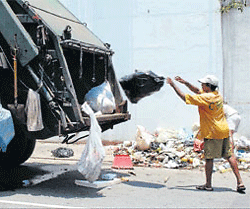
The City’s Residents’ Welfare Associations (RWAs) are happy that BBMP has finally issued a notice making garbage segregation at source mandatory. But they feel it is necessary to prepare the people for the move by educating them.
Many are game for segregating the waste into biodegradable and non- biodegradable, but feel it is difficult to separate it into six categories at this stage. Moreover, the pouraka- rmikas, who actually collect and dispose of the civic waste, have till now been kept in the dark about garbage segregation.
Neither do they have information about the procedure nor have they been given training on how to go about it. The civic workers are of the feeling that implementing the Palike’s order sans planning will backfire.
Ravindra Nath Guru, secretary of the Consumer Care Society in Banashankari II Stage, said, “A big mafia is involved in the transportation of garbage. There is also the powerful garbage clearance contractors’ lobby. In such a situation, members of RWAs found it difficult to suggest ideas for managing garbage. The RWAs are hopeful that the notice will be implemented effectively by educating the people. The Palike must also ensure that the defaulters are fined,” he said.
According to N Mukund Rao, joint secretary of the Citizens’ Action Forum, issuing instructions on garbage segregation is very easy. But creating awareness among the people is challenging, he said.
“The Palike should reach out to people through multiple routes to educate them on segregation, particularly the slum dwellers. Implementation of the segregation order from the grassroots level is important and the corporators play a key role in this,” he said.
Rao suggests that companies should take up garbage segregation as a corporate social responsibility.
Many find the concept of segregation too complicated. Aparna Kumar, organic food activist, said: “The idea of segregation is totally impractical. Residents have to understand the concept first and then explain it to their maids, who do not have the time to segregate waste on a daily basis.”
She pointed out that it is impossible to make sure that garbage is segregated into six different categories every day. There are instances of the BBMP staff dumping the segregated waste in empty sites and burning it.
Moreover, the concept is cleverly devised by BBMP to shirk its responsibility over scientific disposal of waste, she opined.
Kumar felt residents should be made to segregate waste compulsorily as biodegradable and non-degradable, which is more practical.
Leela K, a homemaker, said initially, segregating garbage into six categories might be difficult. However, over a period of time, people would learn.
“Every house can handle wet waste by making compost, but where is the place for it? With BBMP collecting garbage on a daily basis, we need to wait and watch how it will be handled,” she said.
Narayan, president of the Pourakarmikas’ Welfare Association, told Deccan Herald that they had neither received any direction from BBMP in this regard nor any information about training for the pourakarmikas.
“If the concept is implemented suddenly, without planning, it will backfire. Awareness among all sections handling waste is a must,” Narayan said.
He felt pourakarmikas would have to be trained properly, without which they would not be in a position to adhere to segregation rules. Very often, they are harassed by residents.
Hence, till the public are made aware, the idea is not going to be successful, he said.